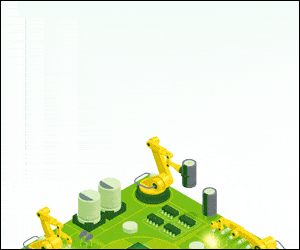The boom in demand of electronics device/gizmo has triggered growth of hardware startups around the world. According to a joint study brought out by Assocham and NEC Technologies in the year 2014, India’s total electronics hardware production estimates for 2014-15 stood at $32.46 billion which is about 1.5% of world electronic hardware production. The domestic consumption of electronic hardware in 2014-15 was $63.6 billion and 58% of this demand was fulfilled with imports. This opens up a huge opportunity for hardware based technology startups.
India has been traditionally very strong in software and tech-enabled services startup area. However, hardware startups face a very different set of problems in comparison to these companies. These challenges are related to longer innovation cycle, technology infrastructure requirement for manufacturing and fulfilment, competition from low cost devices from other countries, to name a few. This makes building a hardware company a much more involved process than software or Internet related models.
The Government, realizing these challenges, has taken significant steps to support hardware startups ranging from setting up hardware oriented Incubation Centres such as Incubation Centre IIT Patna to incentivizing companies in the sector by various policy reforms. This is expected to enable the ecosystem where hardware startups can survive and thrive.
Basic Challenges for hardware startups
Accessibility to relevant technology:
Skills and infrastructure are two key requirements for hardware companies. For startups in ESDM and related sectors such as IoT-enabled devices, it will be critical to have access to infrastructure for prototyping and to skilled PCB designers and manufacturers with the right technology for production.
Longer innovation Cycle:
Hardware prototyping iterations are longer and complex. Unlike software, each iteration of product development leads to larger lead time and investment. Lack of right prototyping infrastructure and expert guidance can jeopardize a startup’s attempts to be early to a very competitive market while remaining cost effective and viable. Labs that will enable rapid prototyping and involvement of seasoned mentors are critical to work around this challenge.
Competition from global players:
Increasing competition from cheaper hardware products from other countries is a major threat. Since India is a price sensitive country, buyers often prefer low cost products over good quality. Beating competitors in the price game may be some time away for Indian startups. However, the differentiation Indian startups should rather be in the innovation/intellectual property component, thus pushing their product up the value chain.
The Way Forward
Government has been consistently working to create basic elements for the ecosystem to thrive. Electronics Development Fund (EDF) has been created to help generate an ecosystem of R&D in electronics in India to promote IP generation and large-scale manufacturing.
One of the major steps has been the initiative to fund and set up Incubators focused on hardware oriented startups. Incubation Centre IIT Patna (IC IIT Patna), the leading technology incubator by IIT Patna is one among them.
ESDM(electronics system design and manufacturing) incubators such as IC IIT Patna help startups by eliminating some of the major challenges they face. Having set up world class prototyping labs, tools for prototyping and fabrication have become more accessible to startups through the incubator. Trained staff adds some of the essential skills required for initial stages of prototyping which is a boost for the startups.
The expert guidance of both technology and business mentors and the access to state of the art infrastructure helps startups to manage the issue of longer innovation cycle. The startups are guided at these incubators to study the market, optimize product features and encourage them to a fail-fast approach so as to shorten their time to market. This not only reduces the overall costs involved, but also makes the product fit to the market.
The incubators very often offer seed funding to incubated startups. IC IIT Patna offers seed fund of upto Rs 10 Lakhs and connects the startup with various government agencies and departments like BIRAC for additional funding if needed. Bionic Hope Pvt Ltd, a hardware startup incubated at IC IITP has received additional funds of 43 lakhs from BIRAC for its product prototyping.
IC IITP has been playing a major role in ecosystem development by reaching out to colleges in Bihar and neighboring states to conduct awareness sessions for technology students on hardware based entrepreneurship. In the recently concluded national level Medtech Hackathon, it sought solutions to predefined problems from the participating teams. IC IITP provides a unique platform for the aspiring entrepreneurs and startups. Startups or startup aspirants can apply for Incubation by sending their business plans to [email protected].










